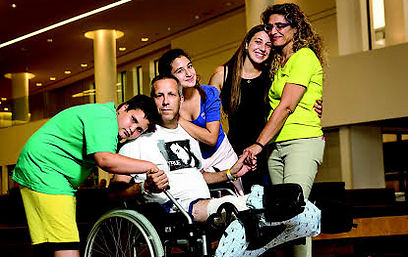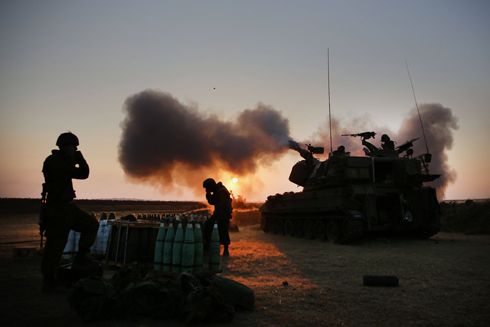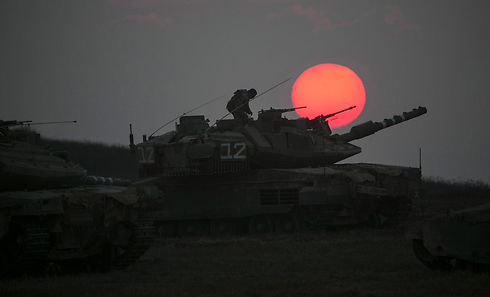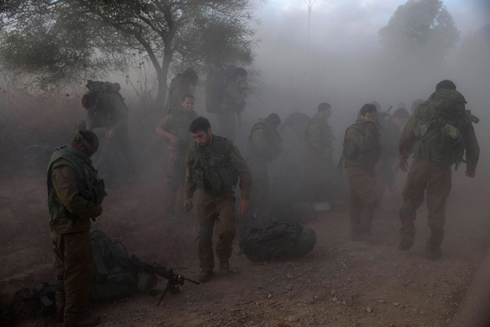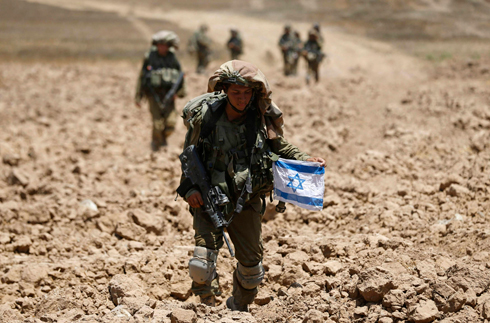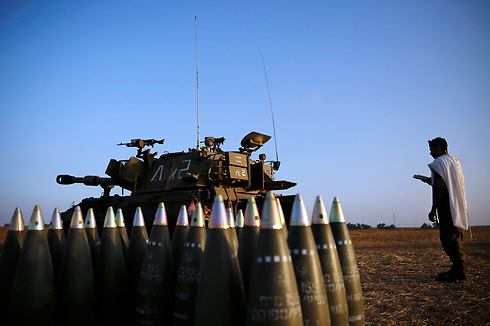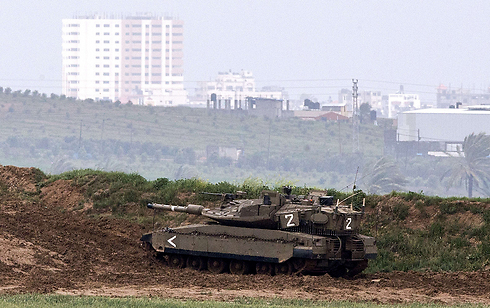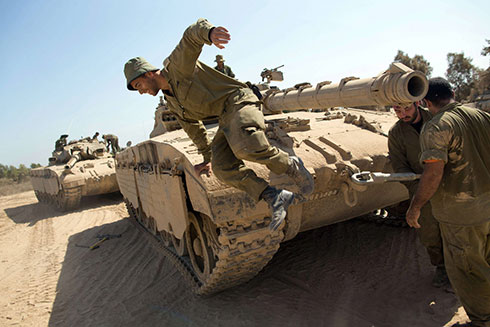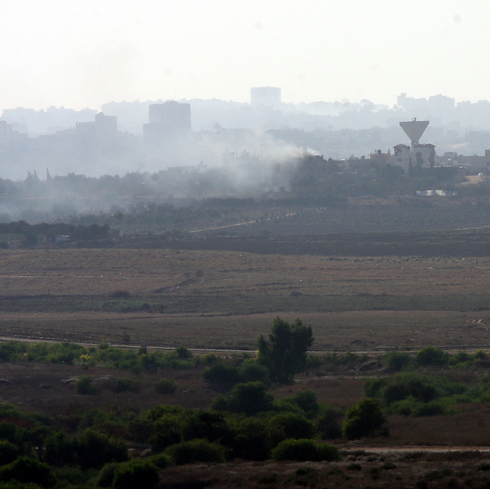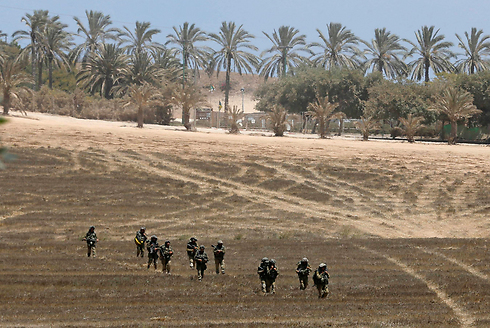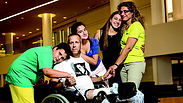
Gadi remains quiet for several long minutes. What were you thinking about, I ask. "About the two legs I had up until a month ago," he replies. "I quickly chase those thoughts away; I don't want to think about what used to be, it won't get me anywhere other than feeling sorry for myself. And I am so not like that," he firmly adds.
On August 26, at around six in the evening, about an hour before the ceasefire between Israel and Hamas went into effect, a heavy barrage of mortars rained down on Kibbutz Nirim, the Yarkoni family's home. One proved deadly. Gadi, the kibbutz coordinator, Ze'ev Etzion, Nirim's security officer, Shahar Melamed, his deputy, and four contract workers were outside near the cowshed, where they were repairing a power line that had been damaged by an earlier hail of mortars, causing a power outage at the kibbutz. The shell that landed near the group of men killed Etzion instantly, critically injured Melamed, who succumbed to his injuries in hospital that evening, and left Gadi severely injured.
"There was a Code Red and I didn't make it to cover in time," he now recounts. "The mortar exploded right by us. When I was lying on the ground, I could tell that my legs were injured; I had no idea of the extent of the injury; I simply shouted that I was hurt so that they would come take care of me. I was fully conscious. I remember people coming to bandage me; an ambulance arrived to take me to the helicopter, and from there we flew to Soroka Hospital. It was a terrible flight; I was in excruciating pain. I didn't care about what happened to my legs; I just wanted a tablet to take away the terrible pain and make me feel nothing."
Gadi didn't lose consciousness, but large portions of the events that took place after the mortar struck have disappeared from his mind. Only after he woke did he hear the story about the oxygen mask paramedics placed over his nose and mouth only for him to ask them to first use it on Shahar Melamed.
Anat, Shahar's wife, who was in the nearby children's dormitory and witnessed everything, had run outside and was holding her bleeding husband's hands and screaming that he needs oxygen. Gadi told the paramedics who were treating him to remove the mark from his face and give it to Shahar. "I don't remember that; I heard Anat talking to Shahar; I don't know what she said. I couldn't see Zevik and didn't hear his voice," Gadi says.
Gadi's wife, Shoham, says the oxygen mask story doesn't surprise her. "That's just so typical of him," she explains, yet her husband doesn't remember.
Last week, they received an e-mail from the parents of a soldier who was at Nirim when the mortar fell and administered first aid to her husband. They wanted to know how he is doing, she says. "They wrote that their son and his commander applied tourniquets to Gadi and that he said to them, 'Leave me, treat the others first.' I'm sure that when he gets a little stronger, he'll be happy to meet the soldiers who helped to save him," Shoham says, and her husband nods, trying to digest the story he's just heard.
Some say that had you been aware of the pending ceasefire, you would have waited, would have stayed in the shelters and gone out to repair the power line only after the firing had stopped, and then everything would have been different, I suggest to Gadi.
"I don't waste time thinking about what could have been," he says. "And I'm not angry about the fact that we weren't told exactly when the ceasefire was set to go into effect. I can't think about that because it would drain my energy and I wouldn't be able to think about my rehabilitation, about my grief, about the death of my friends and the work that needs to be done on the kibbutz."
I don't think about the body I used to have
Gadi knows that coping with his double below-the-knee amputation will be a struggle, but is consoled by the fact that his doctors have promised him he will walk again – on prostheses and with the help of crutches mind you; but that, too, is a lot as far as he's concerned.
"Gadi will soon receive a specially adapted virtual reality program by means of which he will learn to function and overcome the obstacles," explains Dr. Itzhak Siev-Ner, the director of Sheba's Department of Orthopedic Rehabilitation; and he promises: "We'll release him from here walking on two legs."
Gadi, 47, was admitted to the Sheba department on Monday, after spending two weeks at Soroka. The intense pain in his stumps bothers him, and the phantom pain he's expected to experience hasn't even started yet. Meanwhile, the doctors are trying to find the right drugs to ease his pain. He bites his lip throughout the interview, and tries to hide the agony he is suffering, until he can no longer stand it and he asks to stop. I take him to his room. Getting from the wheelchair onto the bed is a near-impossible struggle. The nurse who is called in teaches him to do the thing that just a month ago he took for granted.
Some 15 minutes later, he is lying in bed, pale, exhausted from the effort and a wreck from the pain. When he's asked to rate his pain on a scale of zero to 10, he says six, and receives more medication.
"I know I'm in for some hard work," he says. "I need to allow the stumps to heal from the surgery, and to look after the muscles and the shoulder harness, which now needs to carry me. I need to learn how to shower, to get dressed, to get up, to sit down; but I know myself and know that I will eventually walk on my legs. This morning, I even imagined going overseas with my prostheses. As part of my job, I traveled a lot to Europe to market our yams, and I have no intentions of going easy on myself at all.
"I don't think about the body I used to have; one's body, as I see things, is a tool to do things, and I will do the things from now on with a different tool that I will learn how to operate. I know it'll be okay, I know I need to give it time; but I feel like there is no time, like it's urging me to go back to the life I once had. Ever since the injury, I've been concerned only with the here and now and what lies ahead."
Gabi spent his first 10 days at Soroka in intensive care, in an induced coma and on a respirator, and was then moved to the hospital's orthopedic ward for another five days. They woke him in stages; and already when he was just semi-conscious, his wife began to question him about what he remembered from that fatal hour before the ceasefire.
"He said, 'Zevik was killed and Shahar was injured like me,'" Shoham recounts. "I told him that Shahar fought but didn't make it – and from that moment on, Gadi stopped talking about his friends. He's not a man of many words, and even today he doesn't really speak about his feelings regarding the loss.
"Gadi loved Shahar very much, and they had a special connection. Shahar, Anat and their three children were the only family that remained in Nirim. Anat said she wasn't willing to leave me alone on the kibbutz with the mortars. With Zevik, who was older than Gadi, it was an I've-got-your-back-you've-got-mine kind of friendship. Both of them were very involved in day-to-day security issues; our children are very close; it was a connection of family and many hours spent together."
Do you think a lot about Zevik and Shahar, I ask.
"They're always in my thoughts," Gadi says, "but it's very hard for me to talk about them, and I just want their families to be strong. I had a special relationship with each of them. Shahar was a garage manager and did his job with such dedication and love. Whatever you asked of him, he would do in the best way possible. Zevik is a close friend, and there's a strong connection between his family and mine. Zevik had a heart of gold and I always used to tell him that his good heart was the thing that screwed him. He was the ultimate volunteer. There were those who couldn't understand why he didn't stop doing things. He simply didn't know how to say no."
When I ask about the last conversation he had with Zevik, a smile appears on his pain-etched and serious face. "We were standing there, near where the technicians were repairing the power line, and we were talking about the flak jackets he had brought along for us," Gadi recalls. "I was jokingly complaining that the flak jackets were too small and uncomfortable and I asked him to bring something that would fit us next time."
Shoham would later tell me that Gadi and his two friends had walked around in the flak jackets all day long, and had only taken them off a few hours before the final barrage of mortars because they were hot.
In the intensive care unit, after Gadi had woken partially from the induced coma, Shoham asked her husband if he remembered arriving at the hospital in a helicopter to undergo surgery, and he responded in the affirmative. When she asked if he knew what kind of surgery, he replied without hesitation: "To attach my legs."
That was when Shoham chose to begin telling her husband the truth. She told him he had arrived at the hospital with his legs shattered and that the doctors had battled hard but were unable to save them. "He had a look of surprise on his face. He didn't ask any questions, probably because he was only semi-conscious; but the moment he woke completely, he would constantly look down at his legs, in an effort to see what's going on there," she recalls.
"Even now, I have yet to digest what happened to me, but I try not to think too much," says Gadi. "I am living with the way things are and want to be optimistic all the time. They didn't tell me at first that I had lost my legs. Shoham said I had lost a part of my leg and that it would be alright, that we'd get through it. I believed her; and it took a few days before I realized that large parts were missing."
As if learning of the loss of his legs wasn't enough, Gadi was forced also to deal with the news of the death of his friends; and when I ask him about it, he withdraws into himself and speaks his words slowly: "It's impossible to compare the two things," he says. "They are two very heavy and very different issues. To learn that your two friends, who were with you in their final moments, are no longer alive is terrible. And to learn that you don't have legs is terrible, but different. I now need to learn to live with these two losses.
"I keep on reminding myself that I've been through a lot in life; and I know that if I had looked back all the time, I wouldn't have made it to where I did. At 24, I was diagnosed with glaucoma, an eye disease that impairs your vision. I could have sunk into a depression for the rest of my life just from that; but I went out into a field on the kibbutz, sat down on the wheel of a large tractor, and spent several hours, all alone, asking myself: Where I go from here?
"My answer was that it's more than obvious – you only go upwards. You move ahead and change, and you don't sink. And that's how it was. Fortunately, my vision stopped deteriorating, and while I don't see well enough to drive a car, I do see well enough to walk – and that's how things will go this time around too."
Yarkoni was born on Nirim. His parents, Amalia and Zvi, met on the kibbutz in 1950, after settling there as members of the Hashomer Hatzair movement. Zvi, a truck driver, and Amalia, a history and Bible studies teacher at the Ma'aleh Ha'Basor High School, raised their three children on the kibbutz. Two of them still live in Nirim, while the third, a daughter, lives in Yavne.
"I was born on the kibbutz, my children live here, and I hope to die on the kibbutz at a ripe old age. There's nowhere else for me," Gadi declares.
More so than any other past military conflict, Operation Protective Edge has left a sense of bitterness in its wake, particularly among the residents of the Gaza-border communities. The scenario of another round of fighting in the future is not mere fantasy, but Gadi refuses to go into that. "I'm not a politician and I don't have the ability to decide if the operation was a success or not," he says. "It's clear to me that the solution has to be a combined one – words and blows. I cannot determine the intensity of the blows, but it's clear to me that Kibbutz Nirim cannot afford to be caught up in the next round.
"The people here won't be able to withstand barrages of mortars and rockets again; we're too weak now. Sufficient time needs to pass to allow us to recover from what went on this summer. If that doesn't happen, we'll get to a point at which there'll be a mass exodus of kibbutz members and residents; and we need to get stronger, to absorb the 25 families we were planning to absorb before the operation. Like me, the kibbutz needs to get back onto stable legs and race forward, with the crutches and with the prostheses," Gadi says, and manages, with great effort, to flash a hint of a smile.
Gadi isn’t fond of the terms, dangerous and life-threatening, but knows of their existence and is aware of his friends' fears about remaining in a Code Red-stricken area. "Nirim and Kissufim were a battlefield during this operation and we evacuated families," he says. "I didn't think the women and children should remain here. At the same time, I constantly find myself caught up in what I call the dilemma of the cows. During times of shelling, are we supposed to continue feeding the cows or not? Are we supposed to grow our crops or endanger the lives of our people? Aside from a brief family holiday in Eilat, I remained in Nirim throughout Operation Protective Edge.
"I believe the cows need to be fed and shouldn't be abandoned to die, otherwise we'd be changing our entire concept as a kibbutz and would cease to exist – and I don't even want to consider that. We endanger our people, and I send them out to the cowshed and the crops during wartime; but as I see it, my life on the kibbutz is the right kind of act of Zionism. I struggle with this dilemma, but no one shares the decisions with me and I am the one who eventually makes the decision, and I bear the responsibility. I believed during Protective Edge that we needed to remain on the kibbutz to feed the cows. It's true that I, as someone who paid a price with his legs, and people in general are more important than cows; but if we want to be an agricultural kibbutz that continues to exist after the war, we have to exist during the war too – and that means feeding the cows and the chickens, and tending to the crops, and make every effort not to put people's lives in danger. After all, we live on economics and on love too."
Gadi told me: I'm scared to death
Gadi met Shoham, who was born in Mitzpeh Ramon, when she arrived on the kibbutz with a group of boarding-school students from Jerusalem's Boyer High School. They married 21 years ago and have three children – Shaked, 16, Libby, 11, and Afek, 10.
"I always say that when I married Gadi, I married Nirim, too," Shoham says with a faint smile. "The kibbutz is under and inside his skin; it's a part of his DNA and impossible to remove from there. He remained on the kibbutz during Protective Edge, and the children and I wandered around the north.
"During Operation Cast Lead, Gadi stayed on the kibbutz and suffered a heart attack. In Pillar of Defense, the children were afraid that something was going happen to him. Afek would call him several times a day and say, 'Dad, you don't know how to look after yourself. Leave the kibbutz.' And Gabi would explain that he had responsibilities as the kibbutz coordinator and that nothing would get him to leave. I'm not sure if they understood. During one of our conversations during Protective Edge, I told him that if there's another war, he should know that the children won't let him stay on the kibbutz, even if they have to do so by force."
Shoham recounts the mortar disaster in precise detail, and speaking about it appears to help her to let go of some of the trauma. "I was with Afek at Kibbutz Mishmar Ha'Emek, where we were staying at the time; Libby was at a friend at Moshav Yoshivia near Netivot; and Shaked was at the Joara pre-military base. I was taking Afek and Tal, Zevik Etzion's son, to a movie in Haifa. On the way there, a girl from Tal's group called to tell him about casualties at Nirim.
"The moment I heard the news, I felt all the air rushing out my chest, but conveyed a comforting message to the children. They wanted to call their fathers, and I explained that they were probably busy dealing with the incident and wouldn't answer; but I promised them that if necessary, I'd get them out the movie. They went in and I called Nava, Zevik's wife, my good friend, and, shaking from head to toe, I said to her, 'It's Gadi and Zevik. There's no way they weren't there.' I had a bad feeling. I tried to call Gadi, his sister, Osnat, who lives on the kibbutz, and no one answered me because the lines were down.
"I think the bad feeling that I had stemmed from the conversation I had with Gadi on Sunday, two days before he was hurt. Mortars struck our cowshed that day and Gadi, who is usually a very optimistic person, was different. I noticed a cloud of sorts hanging over him. When I asked what's going on, he replied with a very uncharacteristic answer: 'After seeing what I saw in the cowshed, I'm scared to death. The time between the Code Red alarm and the hit is getting shorter. I'm concerned that the workers in the packing house won't have time to get to the shelter.' He wasn't scared for himself, but I left that day for Mishmar Ha'Emek with an ache in my stomach and feeling very uneasy."
Shoham Yarkoni wasn't deceived by her gut feeling. As she wandered around the Haifa mall, with Afek and Tal in the movie house, she got a call from Gadi's sister. "Just tell me Gadi is injured," she pleaded with her sister-in-law. "He's injured; I don't know to what extent," her sister-in-law replied. "I asked her to promise to tell me only the truth and I went to get the children out the movie. Zevik's Tuli said his legs were shaking.
"I told them that Gadi had been injured. I called Shaked and told her. When I arrived at Joara to pick her up, Gadi's sister called again and told me he was in surgery and had probably lost his legs. I didn’t tell the children about the probably, only that he had sustained an injury to his legs. In the meantime, we received a WhatsApp message about a fatality too. I asked everyone to stop messaging me so that I could drive; but when we reached Mishmar Ha'Emek and Tal went to his mother, I heard him scream and understood that Zevik had been killed. Then came the message that Shahar was in surgery and it was an awful night.
"When they informed me that both of Gadi's legs had been amputated, I told the children and they burst into heart-wrenching sobs. I summoned a little cynicism and said to Afek, 'Just between you and me, your Dad's never been a talented soccer player; so when you ask him to come play from now on, be prepared for him to use the excuse that he has no legs and thus get out of it.' Afek laughed. I assured them that at worst, they'll have a father in a wheelchair and that that's not so bad. He has trouble seeing, and has lost his legs, but he has a head on his shoulders. I explained to them that we have no right to complain and that we will deal with it. I told them that it's alright for them to get angry and to curse, but that it's important to me for them to always end the sentence with, 'the main this is that Dad's alive.'"
Tears of joy
The following day, Shoham, 42, packed their suitcases and moved her children from the north to her parents in Mitzpeh Ramon. She then went to be with her husband at Soroka. "On the way, alone in the car, I knew that the moment I could, I'd bring the children to see their father," she recalls. "I said to myself that in such instances, what the eyes see is better than what the imagination has to offer.
"After Zevik Etzion's funeral, I told them that it would take a while for Dad to wake up and so I had taken photographs of him in the induced coma and on the respirator, and that whoever wanted to could look at the pictures or come with me to visit him. If anyone felt it was too hard for them, it was ok not to come. All three decided to join me on a visit to the hospital. Afek was crying and he explained to me that they were tears of joy because Dad was alive.
"When the children came to visit, I made sure that Gadi's legs remained covered with a blanket; I didn't want to embarrass him, and I explained that to them. Later, after we were moved to Soroka's orthopedic ward, and the wounds had healed somewhat, the children took it upon themselves to say that they know they will have to deal with what happened to Dad's legs at some point, and that that time had come. When Gadi said he wasn't embarrassed and had nothing to hide, the sheet was lowered and his legs lay there bandaged and short."
Gadi's children visited him at Sheba Medical Center for the first time last week. They caressed and hugged him non-stop, and repeatedly told him how much they love him and are pleased to see him operating the wheelchair on his own. "What I miss most is being at home, making you sandwiches in the morning and playing with you – and it'll come," he promised them. And Shaked, the eldest, made a promise of her own too: "We want you to come home already too, but first we'll get the house ready especially for you, so that you can move around freely in the wheelchair." Gadi, with a smile on his face, said he would wait patiently.
The children went back to school without Dad's sandwich. Already on the first day of classes, Shaked made it known that on the 26th of the month, when the ceasefire ends, she won't be at the kibbutz. Her mother, a junior school teacher by profession, hasn't returned to work. She's been traveling back and forth from Nirim to Sheba Medical Center and taking care of her husband. Gadi's parents replaced her one day last week. It's not easy to see 82-year-old parents caring for their 47-year-old son. They are hurting, but don't show their pain.
"I got very emotional when I saw his legs for the first time, but I contained myself," says Gadi's mother. "He's a strong boy and he'll manage. You ask if I shed tears sometimes? Well, that's something I'd like to keep between me and myself. Sometimes the thought crosses my mind that if we had known about the ceasefire, perhaps it wouldn't have happened. But there's no use in crying over spilled milk."
Gadi's father is a little more skeptical. "I'm not sure if Gadi would have suspended his work if they would have informed them of the ceasefire. Somehow I think he would have done the exact same. The mood on the kibbutz is a somber one; we've been traumatized; two key people were killed and Gadi is injured; it will take time for the kibbutz to return to normal. I see the people, and they are not happy like they used to be."
And if there's another round of fighting, I ask Gadi's father, will you stay on Nirim?
"My wife and I will stay here as we did during Protective Edge, along with all the other adults," he says. "But I won't let Gadi stay. Once is enough for him; after all, one shouldn't tempt fate too much. But I know that if he's on his feet and walking again, he'll refuse to leave. He's a farmer and he's tied to his land, and he's also very stubborn."














